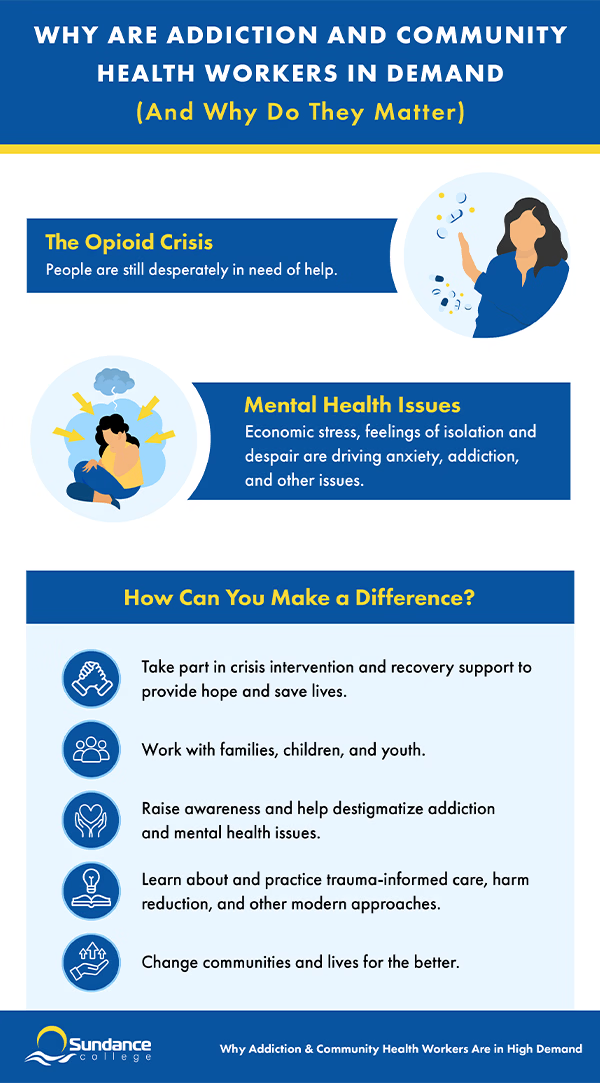Blog / Why Addiction & Community Health Workers Are in High Demand
Why Addiction & Community Health Workers Are in High Demand

Addictions and Community Health Professional Diploma
- Addictions Worker
- Youth Support Worker
- Family Support Worker
- Drop-in Centre Worker
Table of Contents
The ongoing opioid crisis, an increase in addiction issues, and rising rates of mental health concerns are driving increased demand for addictions and community health professionals.
Employers are actively seeking people with the skills and training to provide crisis response, trauma-informed care, and community support.
In addition to a stable career, addictions work and community health jobs also give you a chance to help people and change lives.
Listen to: Why Addiction & Community Health Workers Are in High Demand
Why Demand Keeps Rising
Several factors are driving the continued rise in demand for addictions and community health workers across Canada:
The ongoing opioid crisis continues to devastate communities. Despite progress in harm reduction, Canada still loses an average of 18 people every day to opioid toxicity. Over 53,000 lives have been lost since 2016, and thousands more require emergency or hospital care each year. Behind every emergency call or hospital visit is a need for skilled workers who can deliver support, connect people to treatment, and help families recover.
Mental health challenges are also intensifying. Nearly one in three adults now report experiencing anxiety, addiction, or another mental health condition, often linked to economic stress and the rising cost of living. As those pressures mount, community-based mental health and addiction services are expanding to meet growing demand, resulting in a need for more skilled workers.
These changes are driving an urgent need for trained professionals who want to start a meaningful, stable career helping others.
What Addiction and Community Health Workers Do (And Why it Matters)
Every day, addiction and community health workers make significant differences in both communities and individual lives. Here are just some of the things they do:
- Develop recovery plans and take part in crisis intervention.
- Document, monitor, and follow up with clients.
- Provide addiction and mental health recovery support.
- Work with families, children, and youth who need specialized care.
- Take part in community outreach programs, raising awareness of addictions and other mental health issues, while combatting harmful stigma.
Every one of these responsibilities matters. The people you support in this field are dealing with situations that can be difficult or unsafe to navigate alone. The clarity and support that you provide, the follow-up you offer, and the way you communicate can determine whether someone stays in treatment, understands their next steps, or avoids a situation that could put their health at risk.
The work you do in this field changes outcomes for people who often have nowhere else to turn. When you provide harm reduction support through an understanding of relapse prevention methods and intervention strategies, you reduce immediate risk that could cost someone their safety, their health, or their life. This creates the stability people need to take the next step in their recovery, even if that step is small.
You’ll also work in a way that recognizes the experiences that people carry with them. Many clients have lived through situations that make it hard to trust support systems, stay engaged in treatment, or ask for help. When you take that into account using trauma-informed care techniques, you make it possible for them to participate without shutting down.
Addictions and community health work often creates change one person at a time. As Sundance College Addictions and Community Health Professional instructor Archana B., explains:
“Addiction and community health careers matter. They often involve daily actions that seem small but have an incredibly large impact on real people. Helping someone on their journey to recovery leads to great personal satisfaction. It’s never a minor act.”
These small, consistent actions, whether it’s connecting someone to resources, providing emotional support, or guiding them towards treatment, are what make this profession so essential to community well-being.
What you do in this field has a direct effect on whether someone finds stability and gets the right support. The high demand for skilled workers in this field means there are people waiting for exactly the kind of practical, steady help you’ll can be trained to provide in under a year.

Top Career Paths & Job Opportunities in Addictions and Community Health
This is a field of high community impact careers. Job opportunities in addictions and community health include:
Addictions worker: support individuals recovering from substance use by providing relapse-prevention strategies and community resources.
Youth support worker: guide and mentor at-risk youth through educational, emotional, and social challenges to promote healthy development.
Family support worker: help families navigate difficult circumstances and access community services, while you strengthen relationships through communication and advocacy.
Drop-in centre worker: provide front-line support, resources, and referrals to individuals accessing emergency or short-term community services.
Substance abuse worker: assist clients struggling with addiction through assessment, treatment planning, and coordination with healthcare or rehabilitation programs.

They Make a Difference and You Can Too
The industry is looking for people who are ready to make a change in the world and embrace careers that lead to positive outcomes in our communities. Many people have trained for jobs and quickly entered the industry, finding both career stability and personal fulfillment. You can be next.
Malanie H. completed a diploma program with a practicum and found herself with multiple job offers to choose from.
“Two days after completing the program, I found my first job. It wasn’t the right placement for me, so I went back to the place where I did my practicum. A day later they said they had a position for me.”
Many people who enter addictions and community health work draw inspiration from personal circumstance.
Melanie grew up in an alcoholic home. Later, an accident led to an opiate prescription, which, in turn, spiralled into years of addiction. She says that her schooling prepared her for the work, but she also draws upon lessons learned in her personal journey:
“It’s amazing what I use from my schooling on a daily basis,” she says. “My lived experience makes a big difference too.”
There are those who enter the industry after leaving behind low-paying, unfulfilling jobs. Some begin training for their new career in addictions support directly after high school. Others already have successful careers in other industries then make the move to a field that allows them to make a real impact.
Billie M. already made a good living as a correctional officer. She saw the horrors of addiction firsthand, both at work and within her family. She started training in this field to expand her comprehension of addiction:
“I’ve had inmates pass away in my arms from overdoses. I wanted to understand why my inmates do the things that they do. I also wanted to understand my son, who is now two years sober. After my practicum, I realized: this is what I needed to be doing. I’ve now got a full-time job working as housing caseworker at the Mustard Seed. I used to have a 6-figure salary, but the money doesn’t matter; it’s all about the people. It is very fulfilling. I’d recommend this career it to anybody.”
These are common stories: diploma, practicum, employment, fulfillment. The rewarding nature of the work reinforces the choice to enter the industry. While Stacy N. did find a job after graduating from the program, she hesitates to call it work.
“I’m currently a youth mental health coordinator for a suicide prevention resource centre. It’s amazing to bring these programs to younger kids. I no longer go to work every day, I go to live my passion.”
These success stories demonstrate how meaningful and achievable careers in this field are. Each of these people began by taking a concrete step toward a better direction, and each has been rewarded with career stability and personal fulfillment.
How Sundance College Prepares You
With the right diploma program, you can be fully qualified to work in this industry in less than a year. When enrolling in an addictions and community health diploma program, it’s important to choose wisely.
Sundance College prepares you for a career in this in-demand field by teaching you the skills employers need right now. You’ll get the education you need to succeed as an addictions worker or community health worker, learning about crisis-intervention, mental health support, substance abuse, and community health services. You’ll be ready to make a difference in the lives of people in your community in less than a year.
The Sundance College diploma program includes a 7-week practicum where you’ll work in a community mental health centre, social service or outreach agency, corrections facility, community health setting, or other human services agency, gaining the hands-on, real-world experience that employers look for.
All Sundance College graduates receive lifetime support from our Career Services team, helping them transition from education to employment. This includes personalized resume writing, interview preparation, and job placement assistance. It’s one of the reasons why 84% of Sundance College graduates find employment in their field within six months of graduating.
Graduate Damilola A. initially hesitated to sign up for the program, but found her fears disappeared after her studies began.
“Before I started, I thought I couldn’t do it. But the instructors were so good and supportive, now I’ve got a diploma,” she says.
Damilola’s story shows how rewarding and energizing the Addictions and Community Health diploma program can be. If you want to make a difference, it’s time to explore what this program offers.
Talk to an admissions advisor who can help you explore your options today.
Frequently Asked Questions (FAQs)
-
How does training prepare me to start a career in addictions and community health?
The right diploma program will teach you the skills that employers are looking for today. Industry-experienced instructors will relate these teachings to workplace situations. A practicum will allow you to apply these learnings in real-world, hands-on settings. This will equip you for in-demand community health jobs, addictions jobs, and mental health careers.
-
How quickly can I start working in addictions and community health?
In less than a year, Sundance College students are fully qualified for addictions and community support career opportunities. The 44-week diploma program includes a 7-week practicum where you’ll gain hands-on experience. You’ll be ready for employment after graduation.
-
What types of clients or communities do addictions and community health workers often serve?
People with substance use or behavioural addictions, youth facing instability, families affected by addiction, conflict, or crisis, the unhoused, and other vulnerable populations are among those who receive client care and support services.
-
How do I know if a career in addictions and community health is right for me?
This in-demand career is right for you if you are eager to have social impact and make a difference in your community as well as individual lives and families within it.
-
Which priorities or modern approaches are having a large impact on addictions and community support work?
Trauma-informed care, the integration of mental health services with addictions services, community based and group recovery models, harm reduction, and an emphasis on supporting underserved populations are among the approaches having a major impact on addictions and community support work today.
-
What career opportunities are there in addictions and community support work?
Jobs available to qualified workers include addictions worker, youth support worker, family support worker, drop-in centre worker, and substance abuse worker.
Related Blogs
Subscribe for more career advice
Blog Categories
Share on:
